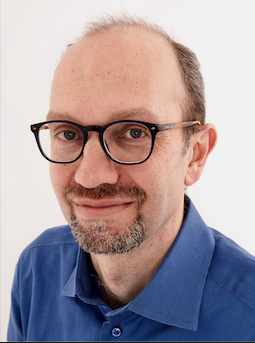New Sparse Sampling Methods: Time-based sampling and sampling along trajectories, by Dr. Pier Luigi Dragotti
New Sparse Sampling Methods: Time-based sampling and sampling along trajectories, by Dr. Pier Luigi Dragotti
Abstract:
Traditional signal processing is based on the idea that an analogue waveform should be converted in digital form by recording its amplitude information at specific time instants. Nearly all data acquisition, processing and communication methods have progressed by relying on this fundamental sampling paradigm.
Interestingly, we know that the brain operates differently and represents signals using networks of spiking neurons where the timing of the spikes encodes the signal’s information. This form of processing by spikes is more efficient and is inspiring a new generation of event-based audio-visual sensing and processing architectures.
In the first part of this talk, we investigate time encoding as an alternative method to classical sampling, and address the problem of reconstructing classes of sparse non-bandlimited signals from time-based samples. We consider a sampling mechanism based on first filtering the input,
before obtaining the timing information using a time encoding machine. Leveraging specific properties of these filters, we derive sufficient conditions and propose novel algorithms for perfect reconstruction of classes of sparse signals.
In the second part of the talk we consider physical fields induced by a finite number of instantaneous diffusion sources, which we sample using a mobile sensor, along unknown trajectories composed of multiple linear segments. We address the problem of estimating the sources, as well as the trajectory of the mobile sensor and validate our approach on real thermal data.
We finally conclude by highlighting further avenues for research in the emerging area of event-based sensing and sampling along trajectories with mobile sensors.
Date and Time
Location
Hosts
Registration
-
 Add Event to Calendar
Add Event to Calendar
Speakers
 Ph.D. Pier Luigi Dragotti of Imperial College London
Ph.D. Pier Luigi Dragotti of Imperial College London
New Sampling methods: Sparse sampling based on timing information and sampling along trajectories
Abstract:
Traditional signal processing is based on the idea that an analogue waveform should be converted in digital form by recording its amplitude information at specific time instants. Nearly all data acquisition, processing and communication methods have progressed by relying on this fundamental sampling paradigm.
Interestingly, we know that the brain operates differently and represents signals using networks of spiking neurons where the timing of the spikes encodes the signal’s information. This form of processing by spikes is more efficient and is inspiring a new generation of event-based audio-visual sensing and processing architectures.
In the first part of this talk, we investigate time encoding as an alternative method to classical sampling, and address the problem of reconstructing classes of sparse non-bandlimited signals from time-based samples. We consider a sampling mechanism based on first filtering the input,
before obtaining the timing information using a time encoding machine. Leveraging specific properties of these filters, we derive sufficient conditions and propose novel algorithms for perfect reconstruction of classes of sparse signals.
In the second part of the talk we consider physical fields induced by a finite number of instantaneous diffusion sources, which we sample using a mobile sensor, along unknown trajectories composed of multiple linear segments. We address the problem of estimating the sources, as well as the trajectory of the mobile sensor and validate our approach on real thermal data.
We finally conclude by highlighting further avenues for research in the emerging area of event-based sensing and sampling along trajectories with mobile sensors.
Biography:
Pier Luigi Dragotti (F) is Professor of Signal Processing in the Electrical and Electronic Engineering Department at Imperial College London. He received the Laurea Degree (summa cum laude) in Electronic Engineering from the University Federico II, Naples, Italy, (1997); the Master degree in Communications Systems from the Swiss Federal Institute of Technology of Lausanne (EPFL), Switzerland (1998); and PhD degree from École polytechnique fédérale de Lausanne (EPFL), Switzerland, (April 2002). Before joining Imperial College in November 2002, he was a senior researcher at EPFL working on distributed signal processing for Swiss National Competence Center in Research on Mobile Information and Communication Systems.
Prof. Dragotti has also held several visiting positions. He was a visiting student, Stanford University (1996); summer researcher, Mathematics of Communications Department at Bell Labs, Lucent Technologies, Murray Hill, NJ (2000); and visiting scientist, Massachusetts Institute of Technology (2011).
Prof. Dragotti is an IEEE Fellow (2017). He was Editor-in-Chief, IEEE Transactions on Signal Processing (2018-2020); Member, IEEE SPS Fellow Evaluation Committee (2020); Associate Editor, IEEE Transactions on Image Processing (2006-2009); Elected Member, IEEE Image, Video and Multidimensional Signal Processing Technical Committee (2008-2013) where he acted as Chair of the award sub-committee (2011-2013); Member, IEEE Signal Processing Theory and Methods Technical Committee (2013-2018); Member, Computational Imaging Technical Committee (2015-2020); and Technical Co-Chair, European Signal Processing Conference (Eusipco) (2012).
Prof. Dragotti is also the recipient of a European Research Council (ERC) Investigator Award, which is awarded to “exceptional research leaders to pursue ground-breaking, high-risk projects” (2011-2016).
Address:England, United Kingdom

